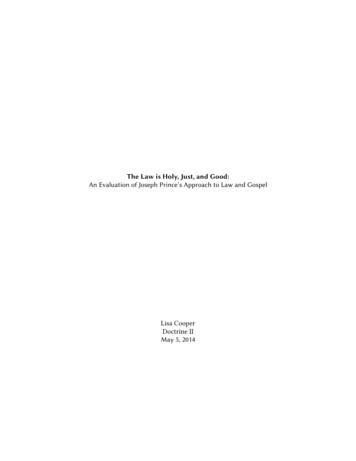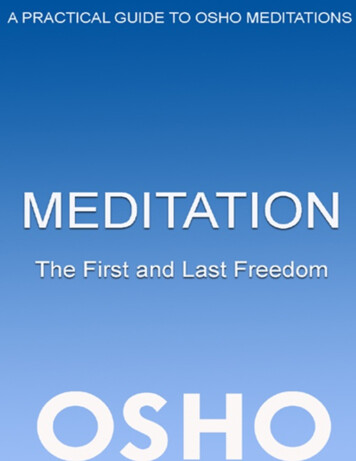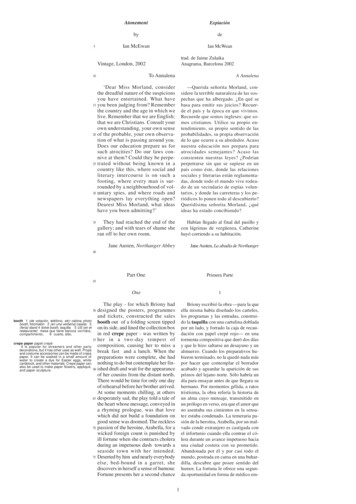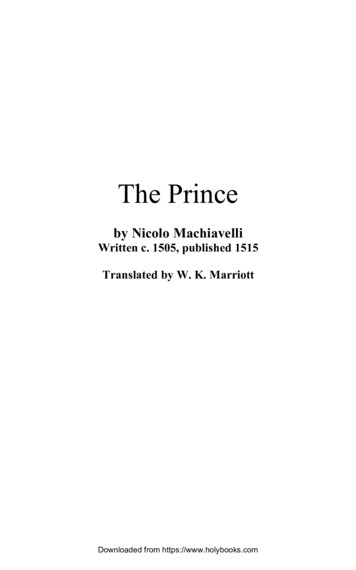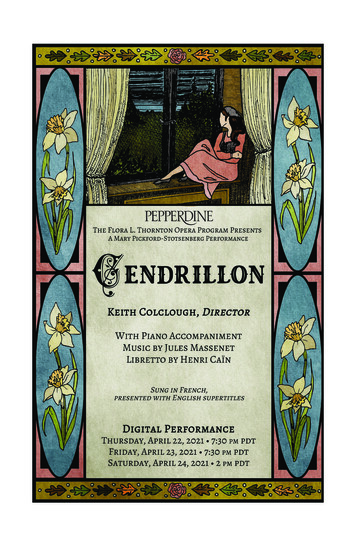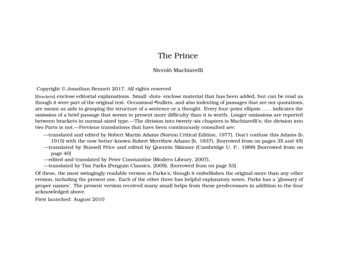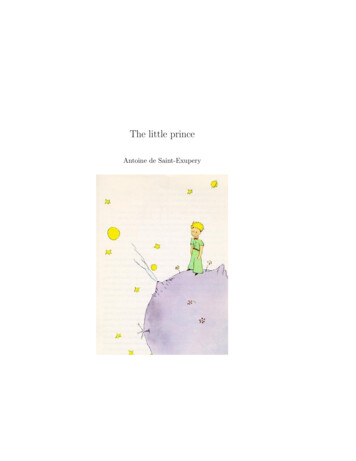
Transcription
The little princeAntoine de Saint-Exupery
2
Chapter 1Once when I was six years old I saw a magnificent picture in a book, calledTrue Stories from Nature, about the primeval forest. It was a picture of a boaconstrictor in the act of swallowing an animal. Here is a copy of the drawing.In the book it said: “Boa constrictors swallow their prey whole, withoutchewing it. After that they are not able to move, and they sleep through thesix months that they need for digestion.”I pondered deeply, then, over the adventures of the jungle. And after somework with a colored pencil I succeeded in making my first drawing. My DrawingNumber One. It looked like this:I showed my masterpiece to the grown-ups, and asked them whether thedrawing frightened them.But they answered: “Frighten? Why should any one be frightened by ahat?”My drawing was not a picture of a hat. It was a picture of a boa constrictordigesting an elephant. But since the grown-ups were not able to understand it,I made another drawing: I drew the inside of the boa constrictor, so that thegrown-ups could see it clearly. They always need to have things explained. MyDrawing Number Two looked like this:3
4CHAPTER 1.The grown-ups’ response, this time, was to advise me to lay aside my drawings of boa constrictors, whether from the inside or the outside, and devotemyself instead to geography, history, arithmetic and grammar. That is why, atthe age of six, I gave up what might have been a magnificent career as a painter.I had been disheartened by the failure of my Drawing Number One and myDrawing Number Two. Grown-ups never understand anything by themselves,and it is tiresome for children to be always and forever explaining things tothem. So then I chose another profession, and learned to pilot airplanes. I haveflown a little over all parts of the world; and it is true that geography has beenvery useful to me. At a glance I can distinguish China from Arizona. If onegets lost in the night, such knowledge is valuable.In the course of this life I have had a great many encounters with a greatmany people who have been concerned with matters of consequence. I havelived a great deal among grown-ups. I have seen them intimately, close at hand.And that hasn’t much improved my opinion of them.Whenever I met one of them who seemed to me at all clear-sighted, I triedthe experiment of showing him my Drawing Number One, which I have alwayskept. I would try to find out, so, if this was a person of true understanding.But, whoever it was, he, or she, would always say: “That is a hat.” Then Iwould never talk to that person about boa constrictors, or primeval forests, orstars. I would bring myself down to his level. I would talk to him about bridge,and golf, and politics, and neckties. And the grown-up would be greatly pleasedto have met such a sensible man.
Chapter 2So I lived my life alone, without anyone that I could really talk to, until I hadan accident with my plane in the Desert of Sahara, six years ago. Somethingwas broken in my engine. And as I had with me neither a mechanic nor anypassengers, I set myself to attempt the difficult repairs all alone. It was aquestion of life or death for me: I had scarcely enough drinking water to last aweek. The first night, then, I went to sleep on the sand, a thousand miles fromany human habitation. I was more isolated than a shipwrecked sailor on a raftin the middle of the ocean. Thus you can imagine my amazement, at sunrise,when I was awakened by an odd little voice. It said:“If you please– draw me a sheep!”“What!”“Draw me a sheep!”I jumped to my feet, completely thunderstruck. I blinked my eyes hard. Ilooked carefully all around me. And I saw a most extraordinary small person,who stood there examining me with great seriousness. Here you may see thebest portrait that, later, I was able to make of him. But my drawing is certainlyvery much less charming than its model.That, however, is not my fault. The grown-ups discouraged me in mypainter’s career when I was six years old, and I never learned to draw anything,except boas from the outside and boas from the inside.Now I stared at this sudden apparition with my eyes fairly starting out ofmy head in astonishment. Remember, I had crashed in the desert a thousand5
6CHAPTER 2.miles from any inhabited region. And yet my little man seemed neither to bestraying uncertainly among the sands, nor to be fainting from fatigue or hungeror thirst or fear. Nothing about him gave any suggestion of a child lost in themiddle of the desert, a thousand miles from any human habitation. When atlast I was able to speak, I said to him:“But– what are you doing here?”And in answer he repeated, very slowly, as if he were speaking of a matterof great consequence:“If you please– draw me a sheep. . . ”When a mystery is too overpowering, one dare not disobey. Absurd as itmight seem to me, a thousand miles from any human habitation and in danger ofdeath, I took out of my pocket a sheet of paper and my fountain-pen. But thenI remembered how my studies had been concentrated on geography, history,arithmetic, and grammar, and I told the little chap (a little crossly, too) that Idid not know how to draw. He answered me:“That doesn’t matter. Draw me a sheep. . . ”But I had never drawn a sheep. So I drew for him one of the two pictures Ihad drawn so often. It was that of the boa constrictor from the outside. And Iwas astounded to hear the little fellow greet it with,“No, no, no! I do not want an elephant inside a boa constrictor. A boaconstrictor is a very dangerous creature, and an elephant is very cumbersome.Where I live, everything is very small. What I need is a sheep. Draw me asheep.”So then I made a drawing.He looked at it carefully, then he said:“No. This sheep is already very sickly. Make me another.”So I made another drawing.
7My friend smiled gently and indulgently.“You see yourself,” he said, “that this is not a sheep. This is a ram. It hashorns.”So then I did my drawing over once more.But it was rejected too, just like the others.“This one is too old. I want a sheep that will live a long time.”By this time my patience was exhausted, because I was in a hurry to starttaking my engine apart. So I tossed off this drawing.And I threw out an explanation with it.“This is only his box. The sheep you asked for is inside.”I was very surprised to see a light break over the face of my young judge:“That is exactly the way I wanted it! Do you think that this sheep will haveto have a great deal of grass?”“Why?”“Because where I live everything is very small. . . ”“There will surely be enough grass for him,” I said. “It is a very small sheepthat I have given you.”He bent his head over the drawing:
8CHAPTER 2.“Not so small that– Look! He has gone to sleep. . . ”And that is how I made the acquaintance of the little prince.
Chapter 3It took me a long time to learn where he came from. The little prince, whoasked me so many questions, never seemed to hear the ones I asked him. It wasfrom words dropped by chance that, little by little, everything was revealed tome.The first time he saw my airplane, for instance (I shall not draw my airplane;that would be much too complicated for me), he asked me:“What is that object?”“That is not an object. It flies. It is an airplane. It is my airplane.”And I was proud to have him learn that I could fly.He cried out, then:“What! You dropped down from the sky?”“Yes,” I answered, modestly.“Oh! That is funny!”And the little prince broke into a lovely peal of laughter, which irritated mevery much. I like my misfortunes to be taken seriously.Then he added:“So you, too, come from the sky! Which is your planet?”At that moment I caught a gleam of light in the impenetrable mystery ofhis presence; and I demanded, abruptly:“Do you come from another planet?”But he did not reply. He tossed his head gently, without taking his eyes frommy plane:“It is true that on that you can’t have come from very far away. . . ”And he sank into a reverie, which lasted a long time. Then, taking my sheepout of his pocket, he buried himself in the contemplation of his treasure.You can imagine how my curiosity was aroused by this half-confidence aboutthe “other planets.” I made a great effort, therefore, to find out more on thissubject.“My little man, where do you come from? What is this ‘where I live,’ ofwhich you speak? Where do you want to take your sheep?”After a reflective silence he answered:“The thing that is so good about the box you have given me is that at nighthe can use it as his house.”9
10CHAPTER 3.“That is so. And if you are good I will give you a string, too, so that youcan tie him during the day, and a post to tie him to.”But the little prince seemed shocked by this offer:“Tie him! What a queer idea!”“But if you don’t tie him,” I said, “he will wander off somewhere, and getlost.”My friend broke into another peal of laughter:“But where do you think he would go?”“Anywhere. Straight ahead of him.”Then the little prince said, earnestly:“That doesn’t matter. Where I live, everything is so small!”And, with perhaps a hint of sadness, he added:“Straight ahead of him, nobody can go very far. . . ”
Chapter 4I had thus learned a second fact of great importance: this was that the planetthe little prince came from was scarcely any larger than a house!But that did not really surprise me much. I knew very well that in additionto the great planets– such as the Earth, Jupiter, Mars, Venus– to which we havegiven names, there are also hundreds of others, some of which are so small thatone has a hard time seeing them through the telescope. When an astronomerdiscovers one of these he does not give it a name, but only a number. He mightcall it, for example, “Asteroid 325.”I have serious reason to believe that the planet from which the little princecame is the asteroid known as B-612.This asteroid has only once been seen through the telescope. That was by aTurkish astronomer, in 1909.On making his discovery, the astronomer had presented it to the International Astronomical Congress, in a great demonstration. But he was in Turkishcostume, and so nobody would believe what he said.Grown-ups are like that. . .Fortunately, however, for the reputation of Asteroid B-612, a Turkish dictator made a law that his subjects, under pain of death, should change toEuropean costume. So in 1920 the astronomer gave his demonstration all overagain, dressed with impressive style and elegance. And this time everybodyaccepted his report.11
12CHAPTER 4.If I have told you these details about the asteroid, and made a note of itsnumber for you, it is on account of the grown-ups and their ways. When youtell them that you have made a new friend, they never ask you any questionsabout essential matters. They never say to you, “What does his voice soundlike? What games does he love best? Does he collect butterflies?” Instead,they demand: “How old is he? How many brothers has he? How much does heweigh? How much money does his father make?” Only from these figures dothey think they have learned anything about him.If you were to say to the grown-ups: “I saw a beautiful house made of rosybrick, with geraniums in the windows and doves on the roof,” they would notbe able to get any idea of that house at all. You would have to say to them: “Isaw a house that cost 20,000.” Then they would exclaim: “Oh, what a prettyhouse that is!”Just so, you might say to them: “The proof that the little prince existed isthat he was charming, that he laughed, and that he was looking for a sheep. Ifanybody wants a sheep, that is a proof that he exists.” And what good wouldit do to tell them that? They would shrug their shoulders, and treat you like achild. But if you said to them: “The planet he came from is Asteroid B-612,”then they would be convinced, and leave you in peace from their questions.They are like that. One must not hold it against them. Children shouldalways show great forbearance toward grown-up people.But certainly, for us who understand life, figures are a matter of indifference.I should have liked to begin this story in the fashion of the fairy-tales. I shouldhave like to say: “Once upon a time there was a little prince who lived ona planet that was scarcely any bigger than himself, and who had need of asheep. . . ”To those who understand life, that would have given a much greater air oftruth to my story.For I do not want any one to read my book carelessly. I have suffered toomuch grief in setting down these memories. Six years have already passed sincemy friend went away from me, with his sheep. If I try to describe him here, itis to make sure that I shall not forget him. To forget a friend is sad. Not everyone has had a friend. And if I forget him, I may become like the grown-ups whoare no longer interested in anything but figures. . .It is for that purpose, again, that I have bought a box of paints and somepencils. It is hard to take up drawing again at my age, when I have never madeany pictures except those of the boa constrictor from the outside and the boaconstrictor from the inside, since I was six. I shall certainly try to make my
13portraits as true to life as possible. But I am not at all sure of success. Onedrawing goes along all right, and another has no resemblance to its subject.I make some errors, too, in the little prince’s height: in one place he is tootall and in another too short. And I feel some doubts about the color of hiscostume. So I fumble along as best I can, now good, now bad, and I hopegenerally fair-to-middling.In certain more important details I shall make mistakes, also. But that issomething that will not be my fault. My friend never explained anything to me.He thought, perhaps, that I was like himself. But I, alas, do not know how tosee sheep through the walls of boxes. Perhaps I am a little like the grown-ups.I have had to grow old.
14CHAPTER 4.
Chapter 5As each day passed I would learn, in our talk, something about the little prince’splanet, his departure from it, his journey. The information would come veryslowly, as it might chance to fall from his thoughts. It was in this way that Iheard, on the third day, about the catastrophe of the baobabs. This time, oncemore, I had the sheep to thank for it. For the little prince asked me abruptly–as if seized by a grave doubt– “It is true, isn’t it, that sheep eat little bushes?”“Yes, that is true.”“Ah! I am glad!”I did not understand why it was so important that sheep should eat littlebushes. But the little prince added:“Then it follows that they also eat baobabs?”I pointed out to the little prince that baobabs were not little bushes, but,on the contrary, trees as big as castles; and that even if he took a whole herd ofelephants away with him, the herd would not eat up one single baobab.The idea of the herd of elephants made the little prince laugh.“We would have to put them one on top of the other,” he said.But he made a wise comment:“Before they grow so big, the baobabs start out by being little.”“That is strictly correct,” I said. “But why do you want the sheep to eatthe little baobabs?”15
16CHAPTER 5.He answered me at once, “Oh, come, come!”, as if he were speaking ofsomething that was self-evident. And I was obliged to make a great mentaleffort to solve this problem, without any assistance.Indeed, as I learned, there were on the planet where the little prince lived–as on all planets– good plants and bad plants. In consequence, there were goodseeds from good plants, and bad seeds from bad plants. But seeds are invisible.They sleep deep in the heart of the earth’s darkness, until some one amongthem is seized with the desire to awaken. Then this little seed will stretch itselfand begin– timidly at first– to push a charming little sprig inoffensively upwardtoward the sun. If it is only a sprout of radish or the sprig of a rose-bush, onewould let it grow wherever it might wish. But when it is a bad plant, one mustdestroy it as soon as possible, the very first instant that one recognizes it.Now there were some terrible seeds on the planet that was the home of thelittle prince; and these were the seeds of the baobab. The soil of that planetwas infested with them. A baobab is something you will never, never be able toget rid of if you attend to it too late. It spreads over the entire planet. It boresclear through it with its roots. And if the planet is too small, and the baobabsare too many, they split it in pieces. . .“It is a question of discipline,” the little prince said to me later on. “Whenyou’ve finished your own toilet in the morning, then it is time to attend to thetoilet of your planet, just so, with the greatest care. You must see to it thatyou pull up regularly all the baobabs, at the very first moment when they canbe distinguished from the rosebushes which they resemble so closely in theirearliest youth. It is very tedious work,” the little prince added, “but very easy.”And one day he said to me: “You ought to make a beautiful drawing, sothat the children where you live can see exactly how all this is. That wouldbe very useful to them if they were to travel some day. Sometimes,” he added,“there is no harm in putting off a piece of work until another day. But when itis a matter of baobabs, that always means a catastrophe. I knew a planet thatwas inhabited by a lazy man. He neglected three little bushes. . . ”So, as the little prince described it to me, I have made a drawing of thatplanet. I do not much like to take the tone of a moralist. But the danger of
17the baobabs is so little understood, and such considerable risks would be run byanyone who might get lost on an asteroid, that for once I am breaking throughmy reserve. “Children,” I say plainly, “watch out for the baobabs!”My friends, like myself, have been skirting this danger for a long time, without ever knowing it; and so it is for them that I have worked so hard over thisdrawing. The lesson which I pass on by this means is worth all the trouble ithas cost me.Perhaps you will ask me, “Why is there no other drawing in this book asmagnificent and impressive as this drawing of the baobabs?”The reply is simple. I have tried. But with the others I have not beensuccessful. When I made the drawing of the baobabs I was carried beyondmyself by the inspiring force of urgent necessity.
18CHAPTER 5.
Chapter 6Oh, little prince! Bit by bit I came to understand the secrets of your sadlittle life. . . For a long time you had found your only entertainment in the quietpleasure of looking at the sunset. I learned that new detail on the morning ofthe fourth day, when you said to me:“I am very fond of sunsets. Come, let us go look at a sunset now.”“But we must wait,” I said.“Wait? For what?”“For the sunset. We must wait until it is time.”At first you seemed to be very much surprised. And then you laughed toyourself. You said to me:“I am always thinking that I am at home!”Just so. Everybody knows that when it is noon in the United States the sunis setting over France.If you could fly to France in one minute, you could go straight into thesunset, right from noon. Unfortunately, France is too far away for that. Buton your tiny planet, my little prince, all you need do is move your chair a fewsteps. You can see the day end and the twilight falling whenever you like. . .“One day,” you said to me, “I saw the sunset forty-four times!”And a little later you added:“You know– one loves the sunset, when one is so sad. . . ”“Were you so sad, then?” I asked, “on the day of the forty-four sunsets?”But the little prince made no reply.19
20CHAPTER 6.
Chapter 7On the fifth day– again, as always, it was thanks to the sheep– the secret of thelittle prince’s life was revealed to me. Abruptly, without anything to lead upto it, and as if the question had been born of long and silent meditation on hisproblem, he demanded:“A sheep– if it eats little bushes, does it eat flowers, too?”“A sheep,” I answered, “eats anything it finds in its reach.”“Even flowers that have thorns?”“Yes, even flowers that have thorns.”“Then the thorns– what use are they?”I did not know. At that moment I was very busy trying to unscrew a boltthat had got stuck in my engine. I was very much worried, for it was becomingclear to me that the breakdown of my plane was extremely serious. And I hadso little drinking-water left that I had to fear for the worst.“The thorns– what use are they?”The little prince never let go of a question, once he had asked it. As for me,I was upset over that bolt. And I answered with the first thing that came intomy head:“The thorns are of no use at all. Flowers have thorns just for spite!”“Oh!”There was a moment of complete silence. Then the little prince flashed backat me, with a kind of resentfulness:“I don’t believe you! Flowers are weak creatures. They are naive. Theyreassure themselves as best they can. They believe that their thorns are terribleweapons. . . ”I did not answer. At that instant I was saying to myself: “If this bolt stillwon’t turn, I am going to knock it out with the hammer.” Again the littleprince disturbed my thoughts.“And you actually believe that the flowers–”“Oh, no!” I cried. “No, no no! I don’t believe anything. I answered youwith the first thing that came into my head. Don’t you see– I am very busywith matters of consequence!”He stared at me, thunderstruck.“Matters of consequence!”21
22CHAPTER 7.He looked at me there, with my hammer in my hand, my fingers black withengine-grease, bending down over an object which seemed to him extremelyugly. . .“You talk just like the grown-ups!”That made me a little ashamed. But he went on, relentlessly:“You mix everything up together. . . You confuse everything. . . ” He wasreally very angry. He tossed his golden curls in the breeze.“I know a planet where there is a certain red-faced gentleman. He has neversmelled a flower. He has never looked at a star. He has never loved any one.He has never done anything in his life but add up figures. And all day he saysover and over, just like you: ’I am busy with matters of consequence!’ And thatmakes him swell up with pride. But he is not a man– he is a mushroom!”“A what?”“A mushroom!”The little prince was now white with rage.“The flowers have been growing thorns for millions of years. For millions ofyears the sheep have been eating them just the same. And is it not a matterof consequence to try to understand why the flowers go to so much trouble togrow thorns which are never of any use to them? Is the warfare between thesheep and the flowers not important? Is this not of more consequence than afat red-faced gentleman’s sums? And if I know– I, myself– one flower whichis unique in the world, which grows nowhere but on my planet, but which onelittle sheep can destroy in a single bite some morning, without even noticingwhat he is doing– Oh! You think that is not important!”His face turned from white to red as he continued:“If some one loves a flower, of which just one single blossom grows in all themillions and millions of stars, it is enough to make him happy just to look atthe stars. He can say to himself, ’Somewhere, my flower is there. . . ’ But if thesheep eats the flower, in one moment all his stars will be darkened. . . And youthink that is not important!” He could not say anything more. His words werechoked by sobbing.The night had fallen. I had let my tools drop from my hands. Of whatmoment now was my hammer, my bolt, or thirst, or death? On one star, oneplanet, my planet, the Earth, there was a little prince to be comforted. I tookhim in my arms, and rocked him. I said to him:“The flower that you love is not in danger. I will draw you a muzzle for yoursheep. I will draw you a railing to put around your flower. I will–”I did not know what to say to him. I felt awkward and blundering. I didnot know how I could reach him, where I could overtake him and go on hand inhand with him once more.It is such a secret place, the land of tears.
Chapter 8I soon learned to know this flower better. On the little prince’s planet the flowershad always been very simple. They had only one ring of petals; they took upno room at all; they were a trouble to nobody. One morning they would appearin the grass, and by night they would have faded peacefully away. But one day,from a seed blown from no one knew where, a new flower had come up; and thelittle prince had watched very closely over this small sprout which was not likeany other small sprouts on his planet. It might, you see, have been a new kindof baobab.The shrub soon stopped growing, and began to get ready to produce a flower.The little prince, who was present at the first appearance of a huge bud, feltat once that some sort of miraculous apparition must emerge from it. Butthe flower was not satisfied to complete the preparations for her beauty in theshelter of her green chamber. She chose her colours with the greatest care. Sheadjusted her petals one by one. She did not wish to go out into the world allrumpled, like the field poppies. It was only in the full radiance of her beautythat she wished to appear. Oh, yes! She was a coquettish creature! And hermysterious adornment lasted for days and days.Then one morning, exactly at sunrise, she suddenly showed herself.And, after working with all this painstaking precision, she yawned and said:23
24CHAPTER 8.“Ah! I am scarcely awake. I beg that you will excuse me. My petals arestill all disarranged. . . ”But the little prince could not restrain his admiration:“Oh! How beautiful you are!”“Am I not?” the flower responded, sweetly. “And I was born at the samemoment as the sun. . . ”The little prince could guess easily enough that she was not any too modest–but how moving– and exciting– she was!“I think it is time for breakfast,” she added an instant later. “If you wouldhave the kindness to think of my needs–”And the little prince, completely abashed, went to look for a sprinkling-canof fresh water. So, he tended the flower.So, too, she began very quickly to torment him with her vanity– which was,if the truth be known, a little difficult to deal with. One day, for instance, whenshe was speaking of her four thorns, she said to the little prince:“Let the tigers come with their claws!”“There are no tigers on my planet,” the little prince objected. “And, anyway,tigers do not eat weeds.”“I am not a weed,” the flower replied, sweetly.“Please excuse me. . . ”“I am not at all afraid of tigers,” she went on, “but I have a horror of drafts.I suppose you wouldn’t have a screen for me?”“A horror of drafts– that is bad luck, for a plant,” remarked the little prince,and added to himself, “This flower is a very complex creature. . . ”“At night I want you to put me under a glass globe. It is very cold whereyou live. In the place I came from–”But she interrupted herself at that point. She had come in the form of aseed. She could not have known anything of any other worlds. Embarassed overhaving let herself be caught on the verge of such a naı̈ve untruth, she coughedtwo or three times, in order to put the little prince in the wrong.“The screen?”“I was just going to look for it when you spoke to me. . . ”Then she forced her cough a little more so that he should suffer from remorsejust the same.
25So the little prince, in spite of all the good will that was inseparable fromhis love, had soon come to doubt her. He had taken seriously words which werewithout importance, and it made him very unhappy.“I ought not to have listened to her,” he confided to me one day. “One neverought to listen to the flowers. One should simply look at them and breathetheir fragrance. Mine perfumed all my planet. But I did not know how to takepleasure in all her grace. This tale of claws, which disturbed me so much, shouldonly have filled my heart with tenderness and pity.”And he continued his confidences:“The fact is that I did not know how to understand anything! I ought to havejudged by deeds and not by words. She cast her fragrance and her radiance overme. I ought never to have run away from her. . . I ought to have guessed all theaffection that lay behind her poor little strategems. Flowers are so inconsistent!But I was too young to know how to love her. . . ”
26CHAPTER 8.
Chapter 9I believe that for his escape he took advantage of the migration of a flock of wildbirds. On the morning of his departure he put his planet in perfect order. Hecarefully cleaned out his active volcanoes. He possessed two active volcanoes;and they were very convenient for heating his breakfast in the morning. He alsohad one volcano that was extinct. But, as he said, “One never knows!” So hecleaned out the extinct volcano, too. If they are well cleaned out, volcanoesburn slowly and steadily, without any eruptions. Volcanic eruptions are likefires in a chimney.On our earth we are obviously much too small to clean out our volcanoes.That is why they bring no end of trouble upon us.The little prince also pulled up, with a certain sense of dejection, the lastlittle shoots of the baobabs. He believed that he would never want to return.But on this last morning all these familiar tasks seemed very precious to him.And when he watered the flower for the last time, and prepared to place herunder the shelter of her glass globe, he realised that he was very close to tears.“Goodbye,” he said to the flower.But she made no answer.“Goodbye,” he said again.The flower coughed. But it was not because she had a cold.“I have been silly,” she said to him, at last. “I ask your forgiveness. Try tobe happy. . . ”He was surprised by this absence of reproaches. He stood there all bewildered, the glass globe held arrested in mid-air. He did not understand this quietsweetness.“Of course I love you,” the flower said to him. “It is my fault that you havenot known it all the while. That is of no importance. But you– you have beenjust as foolish as I. Try to be happy. . . let the gla
Once when I was six years old I saw a magnificent picture in a book, called True Stories from Nature, about the primeval forest. It was a picture of a boa constrictor in the act of swallowing an animal. Here is a copy of the drawing. In the book it said: “Boa c
